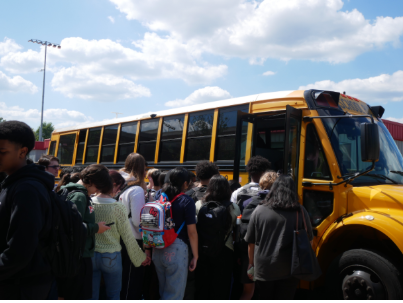In today’s increasingly interconnected society, technology is a key part of almost all aspects of life. It would be hard to imagine our entire country, or even our community, functioning without the use of phones, computers, email, video, text and, most importantly, the internet. It goes without saying that certain institutions like healthcare, transportation and housing would be rendered dangerously inefficient and perhaps unable to function at all without the array of technical advantages we have access to. Not excluded from these essential public services that rely on communications technology is the education system. On any given day, students are required to use their phones to communicate with parents or guardians, keep track of their workload or traverse the hallways.
[Read Theogony’s latest coverage of the cell phone ban here.]
This state of technological harmony, which is vital to the functioning of our school, has now been severely disrupted. Recently, the school board passed a full cell phone ban, which, as students return from winter break, is now in effect. The new policy comes several months after Gov. Glenn Youngkin (R) issued an executive order creating “cell phone-free schools” throughout Virginia. The Alexandria school board’s adaptation of the policy has little flexibility, even for elective classes that rely on phones.
The ban does also allow for a few exceptions, specifically in relation to the school’s dependence on Minga for digital student IDs and hall passes. This provision, however, is only for the remainder of the 2024-25 school year, leaving any use of the app after the fact shrouded in speculation. This is one of many problems with the phone policy that highlight its overall impracticality. It now seems as though the status of Minga is hanging in limbo, and it is hard to say exactly what will become of it. For something that Alexandria City High School has invested so much time, energy and money into pushing it onto students, it doesn’t stand to reason that the school would abandon it in favor of an already controversial cell phone procedure.
The possible solution is predictably even more complex, as students might be compelled to use their chromebooks for Minga. The impracticality of students having to use Minga on their computers can hardly be understated. Students will have to carry their chromebooks everywhere, constantly opening them, loading up Minga — a laborious task under the school’s already strained Wi-Fi — awkwardly positioning their chromebook so that their ID will be scanned, closing them and then having to put them back in their bags, only to have to repeat the same tedious process multiple times a day. Now imagine 100 kids waiting in line to scan their ID, and the inconvenience of this ordeal is exponentially multiplied. The dangers of making students wait like this can already be observed with the confusing transportation process.
[Read Theogony’s latest coverage of intercampus transportation here.]
One of the core problems with the total ban on cell phones is the functional lack of incorporating student voices, thus leading to an out-of-touch policy that will likely be met with resistance from the student body at ACHS. If, for example, a student were to refuse having their phone confiscated or stored away for the period, how would the new procedure confront this? The policy states that any student who violates the ban will be met with “disciplinary action in accordance with ACPS policy including … student suspension/expulsion.”
The consequences for any infraction are left far too open-ended, and only suggest the harshest forms of punishment for misconduct would seem relatively trivial. Many teens use their phone in class. Does that mean each one of them would be reprimanded for simply texting a parent or setting a reminder? If so, would every teacher then have to facilitate those consequences? How many students would be facing discipline?
The best solution to the “problem” of phone usage in classrooms would be to simply stop fighting it. As ridiculous as it may sound, the proposition of waging further war against electronics in education is even more ridiculous. Humans — and teenagers in particular — are social beings. Communication, cooperation, connection are all behaviors that are inherent to human activity, and technological advancements made in recent decades have only amplified these healthy urges. How could teachers assign group-based projects and at the same time prohibit the very tool that makes teamwork exponentially more efficient?
It is important for our education system to break from its rigidity, and perhaps embrace learning that integrates cell phones and other personal devices. Alongside promoting digital security and the healthy usage of social media, phones should be recognized as an incredible facilitator of education that enables students and teachers to access the bulk of the world’s knowledge in mere seconds.
Of course, it’s important not to get lost in utopian ideals of education, as any great change starts with feet on the ground. More immediately, students must get more involved with community decision making, particularly in regards to education. Teenagers should be able to have real input on important policies such as the phone ban. Of course, this decision making process would also extend to teachers and administrators, so students are able to discuss with them outside the austere setting of a classroom. The controversy of phones in learning spaces is undoubtedly a complex one, with multiple perspectives being required to make any sort of progress towards a solution. It is imperative that when we approach difficulties in our discourse, that we act not as students, not as administrators, not as teachers, but as a school.











Noah Sternberg • Jan 4, 2025 at 1:45 pm
Teenagers do have real input on important policies, such as the phone ban, not only through general free speech but also through our student representatives on the School Board. And while they may have been successful at salvaging then board member Elnoubi’s vote against (a bit of a theme with councilmember Elnoubi in December, as he also chose to abstain from the Capital Improvement Budget approval vote), 8-1 is not exactly a “controversial” decision.
In my experience, I have never been asked to use Minga as a hall pass in either building, and have never been questioned by a security guard about the integrity of whatever lanyard-pass my teacher has given me. While this is obviously anecdotal, I don’t see Minga hall-passes becoming an issue in the fall of 2025; standard, reusable hall passes, I think will do just fine. Signing in in the morning, of course, could potentially be an issue, but I think this depends on the interpretation of the ban itself; if the ban’s major condition is truly “bell to bell,” then it shouldn’t be an issue for anyone to use their phone to sign in with Minga in the morning, something generally accomplished before the day’s first class, and thus before the first bell. If the ban, however, is interpreted by administrators as disallowing phone usage on compass overall, the situation becomes murkier and issues around morning sign in, while most likely minor, might arise.
“Many teens use their phone in class. Does that mean each one of them would be reprimanded for simply texting a parent or setting a reminder?” To classify in-class phone usage as majoritively parent-texting and reminder-setting, I think is an over classification and in bad faith. Obviously, the vast majority of phone usage in class is for entertainment/distraction purposes or to message a friend. I can only assume that there are some students who only ever use their phone to set homework reminders to text their parents about a serious situation, but I believe that population is vastly outnumbered by the rest of us.
I agree that parent communication will become an issue, and I think this issue itself may be the most pressing that the ban has to offer, and it is this issue that I think we should focus on.
I think it’s too easy for us, students, to continually group both chromebooks and cellphones under “technology,” and act as if the phone ban will affect both. The same can be said for grouping cellphone usage in school to cellphone usage out of school. This is fallacious, and engendering this kind of interpretation of the ban, where school is now impossible with just access to chromebooks, and group projects are subsequently void due to being unable to text group members during school hours, will harbor inefficiency and unnecessary resistance when actually trying to implement the policy.
Attacking a major issue like this head on, as this ban does, will of course leave a plethora of smaller issues to be dealt with. However, as “it is imperative that…we approach difficulties in our discourse…not as students…but as a school,” we must avoid pushing skewed and ingenuous interpretations.